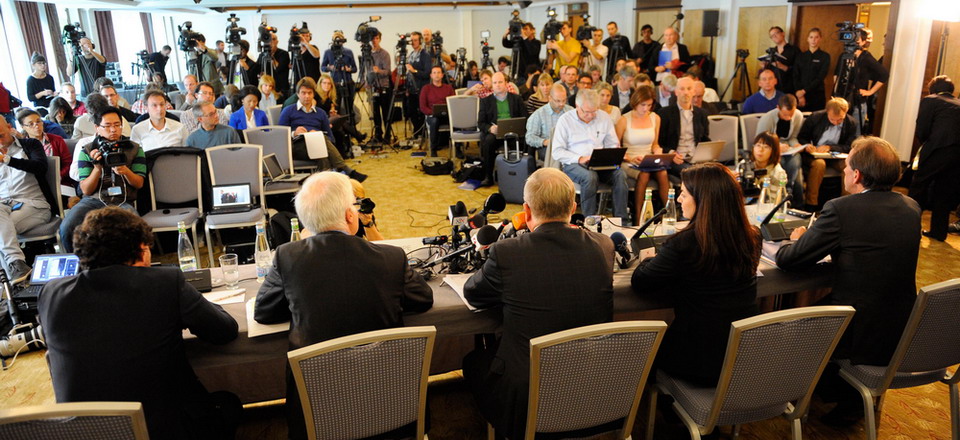
One year ago the UCI gave its response to USADA’s reasoned decision and the ban imposed on Lance Armstrong. The media was convened to a hotel in Switzerland where Pat McQuaid announced the UCI accepted USADA’s verdict and it would ban Armstrong and strip him of almost all his results.
For a moment it prised open the UCI and its decision-making process but in the weeks and months that followed the UCI seemed to regress back towards obstruction and bizarre press releases. What’s happened since?
The UCI’s response in the short and medium term was weak and confused. It relied on a strategy that if you say something enough times then people will accept it. Three examples…
“It is plausible that it was only a skin cream indeed”
That was the verdict of a leaked UCI memo regarding the four positive tests for cortisone by Lance Armstrong during the 1999 Tour de France. The UCI kept running with this idea that if it could explain away the cause of the positive test then all would be ok. Perhaps you think of the case of Alberto Contador’s clenbuterol positive in the 2010 Tour de France where he could get off if he showed where the banned substance came from? But you’ll remember Contador had to prove where any contamination came from, presenting a plausible hypothesis was not enough. But back in 1999 the rules were even stricter. Before a doping control a rider had to declare whether they were using any medication and Armstrong declared “néant” or nothing on the form. With this in mind, we now go to rule 43 from the UCI’s rulebook in 1999.
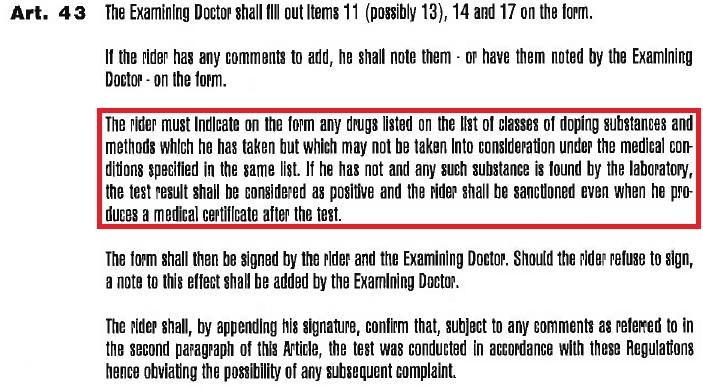 The highlighted paragraph says if the rider fails to list a product like cortisone on the test paperwork then “the test result shall be considered as a positive and the rider shall be sanctioned even when he produces a medical certificate after the test.” In other words Armstrong should have been disqualified and banned during the 1999 Tour de France. Even the talk of backdated TUE letters, which Armstrong confessed to, didn’t matter because no matter what was cooked up or even plausible, if there was a positive test Armstrong should be thrown out of the race.
The highlighted paragraph says if the rider fails to list a product like cortisone on the test paperwork then “the test result shall be considered as a positive and the rider shall be sanctioned even when he produces a medical certificate after the test.” In other words Armstrong should have been disqualified and banned during the 1999 Tour de France. Even the talk of backdated TUE letters, which Armstrong confessed to, didn’t matter because no matter what was cooked up or even plausible, if there was a positive test Armstrong should be thrown out of the race.
“There was no cover-up of a Tour of Switzerland positive”
Factually correct because Armstrong did not test positive in the 2001 Tour de Suisse. However his samples were marked as suspicious by the Lausanne lab when testing for EPO and the UCI knew this. As this blog revealed in May, the UCI tested Armstrong just ten times during the 2001 Tour de France that followed. Ten tests might sound good but was in fact the minimum number possible given Armstrong was third in the prologue, won three stages and held yellow jersey for the final week. It’s normal for the race leader and the first three on a stage to get tested by default every day. Additionally only five of these ten tests included EPO tests. So the “strongly suspicious” lab data appears to have got no follow-up, Armstrong was only tested in set-piece anti-doping controls and half of these didn’t have an EPO test. No cover-up but the UCI appeared to ignore the formal warning signs.
“Lance Armstrong has no place in cycling”
That was Pat McQuaid’s response after the UCI press conference. He tried to sound tough… but later rowed back on this. Yet it was the actions prior to this outburst that made McQuaid’s words bizarre. The UCI had been pushing back against USADA’s efforts to prosecute Lance Armstrong and others, a fight it had not tried on behalf of others. At times the UCI’s communications looked like a copy n’paste from Armstrong’s legal team and it was very awkward to watch the UCI issue misguided press releases attacking WADA or witness Pat McQuaid appearing ignorant of his own rules. We still don’t know why the UCI tried to obstruct USADA. It seemed the UCI was acting on behalf of Hein Verbruggen and the Dutchman was clearly rattled, launching a bizarre tirade against WADA to his IOC colleagues.
Stalled reform
Regardless of motivation, once the USADA verdict was out the UCI had to act: accept it or appeal. It should have been the start of something but just as the UCI stalled before, it stalled after too. We got an Independent Commission but it became too independent and was dissolved by the UCI. McQuaid floated the idea of “an audit” but it never got started. Arguably the handling of of the USADA verdict cost McQuaid his job as UCI President, there were other mistakes but this compounded everything.
Truth and Reconciliation
Now with President Cookson there is a “high level dialogue” between the UCI and WADA to establish a “truth and reconciliation” process (T&R). Hopefully they can find a better name to start with but I’m sceptical about the process because there’s little incentive for riders to come forward
- Doping is a criminal matter in some countries and if athletes confess to WADA they cannot expect immunity from criminal prosecution
- Riders have got away with it for years and trade on their reputations. Look at Stuart O’Grady, venerated as hero but he’d kept quiet about his EPO use. His confession looked bungled but anyone who’s got away without being caught has no incentive to come forward
- Events are so long ago and there’s no proof. If one rider comes forward and accuses a team mate or a doctor they need proof to make it stick otherwise it would become a forum for calumny and counter-claim
- The risk is that T&R becomes a vehicle for Lance Armstrong rather than the sport as a whole
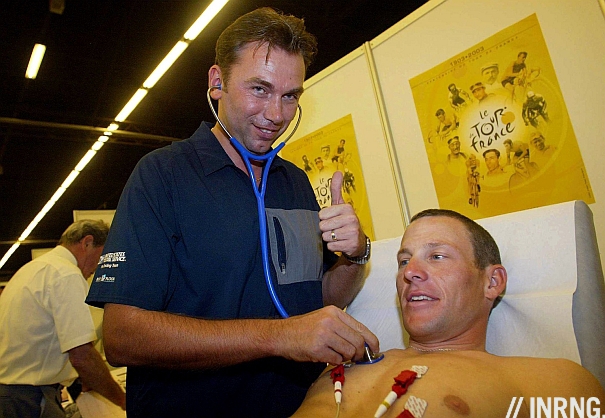
And there’s more
One year on and there are more loose ends than a bowl of spaghetti. Lance Armstrong got banned and purged from the history books but prosecutions against the likes of Johan Bruyneel, Michele Ferrari and Jose “Pepe” Martí are still simmering on some USADA backburner, in part held up by the lawsuits between Armstrong and others and various agencies of the US government and also it seems some are delaying their lawsuits in anticipation of a T&R process.
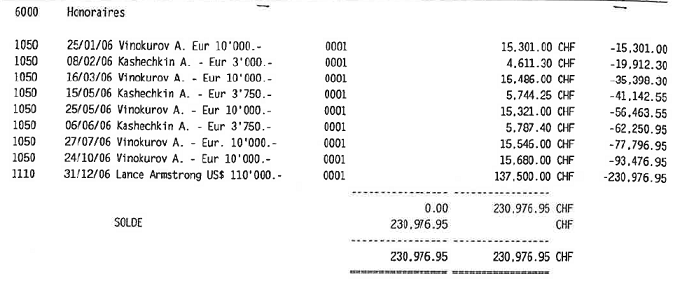
The reasoned decision was packed with more. Take the bank listings above which includes a familiar manager of the Astana team. Investigations are still rumbling on in Italy over doping but also following a tax-dodging trail of money. The UCI did start an investigation but it seemed to stall, it invited Kolobnev and Vinokourov to answer questions but they were called in on Christmas Day on the Russian calendar and you can imagine the no-show. We’ve yet to get an explanation of what Vinokourov was doing wiring large sums of money to Ferrari.
Media industry
If the procedural aspect has ground to a halt there’s been plenty of action elsewhere. Armstrong might have stopped the charity work and lost his sponsors but the media circus rolls on. Oprah chat shows, multiple books, documentaries and as you read this a feature film is in production. It’s as if everyone except the UCI wants to explore the story.
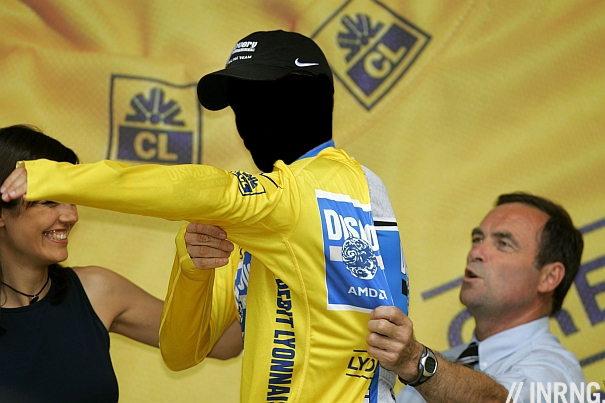
Conclusion
Plenty has happened in one year but the UCI hasn’t gone anywhere, as if pedalling on a bike with no chain. Armstrong should have been banned in 1999 and they haven’t explained why he got the minimal number of tests despite the 2001 suspicious lab tests. As it happens we still haven’t seen the receipts for Armstrong’s donations either. Much of the UCI’s effort has gone into justifying what it did in the past rather than asking whether those actions were appropriate.
Pat McQuaid has gone and with him Ian McClure and Philippe Verbiest, the pair behind so many of the angry press releases. The communication was poor but it wasn’t media management, it signified a siege mentality.
At least the UCI and WADA are reconciled now but it’ll be hard to see where the truth and reconciliation process goes. Meanwhile the likes of Bruyneel, Martí and Ferrari still haven’t been prosecuted; the wheels of justice have punctured. Maybe we’ll have to revisit this subject again in October 2014?

Thanks for the recap INRNG.
There are so many sides, backstories and angles to this that it’s hard for me (and probably the average fan) to keep up with it, let alone put it into perspective. Your article does an excellent job at this.
I really don’t know what the UCI should do. I guess launch an investigation into its own past, but that would mean Cookson would basically have to trial his predecessors. I can’t see that happening without lengthy legal battles, which will again make the entire thing a story with no conclusion.
Excellent points on the T&R comission where you illustrate the risks involved. Problem is though, what else can UCI&Wada do to further clean up the sport? I honestly don’t know.
What can the UCI do? Let WADA/NADOs define the tests and open cases.
ASO/UCI simply did not order EPO tests for Armstrong. There’s no rule that says which tests the anti-doping organization must run. While there is the appearance of testing, it was and exceedingly likely still theater for the UCI’s favored riders.
Couple that authority with an expanded budget for back-dated testing and we’d see less doping.
Unfortunately, the next guy to run WADA is an IOC official from the sports administration side instead of a desperately needed more independent person. This was always the IOC’s intention with WADA anyway, better doping controversy control, not less doping.
INRNG, you summarise the doubts I’ve had for ages about a T&R. There is no, absolutely no, incentive for people to come forward. And remember, not just riders – swannies, coaches, DSs, team doctors – absolutely none. For the good of the future of the sport? Sorry, aint going to be enough. Riders and staff who have things to confess, fall into two camps: 1. either working in a very different, clean environment now – and why would they want to expose their pasts? 2. still up to old tricks – they aint going to put their hand up.
Re investigation into UCI’s past: I’m actually more confident that this can happen.
Well why not make some incentives? Off the top of my head:
– No prosecution for information given during T&R, but lifetime bans for anything that comes to light subsequently. The opportunity for a clean slate.
– If information given during T&R leads to a prosecution after the “grace” period, then there could even be financial rewards.
Who knows, there may be even be a sort of reverse-omerta. If a critical mass of riders come forward, it may encourage others to do so. It would be more attractive to be just one more name on a list of many riders, rather than risk the headline of getting caught on your own that we have now.
At least a T&R process would give any riders who want to clean their slate a chance. Currently, there isn’t really a mechanism to do so.
How many riders – or coaches, managers etc – really want to wipe the slate clean? For how many is there really a situation where they carry so much guilt, its making their lives a misery. Its human nature to weigh up the risk/reward. And human nature to take the gamble that if they dont hold up their hand, they’ll get away with it.
As for consequences…look at what happened during the Puerto trial. Riders – ex and current – denying under oath. Perjury.
As for the suggestion ‘If information given during T&R leads to a prosecution after the “grace” period, then there could even be financial rewards’…Where to even start with how bad an idea that would be…
I tend to agree, it’s not the prosecution that worries them it is the reputational damage. See Stuart O’Grady who could be making a living like Robbie McEwen as a legend of Aussie cycling but is now rumbled for EPO use and a poorly handled confession. He’s not facing a sporting sanction, just a public opinion one.
Note all offences beyond 8 years are outside the statute of limitations. And for those asking about Armstrong and the 8 year limit… where false statements have been given in the past this can reset the clock, as agreed in USADA vs Hellebuyck where the Belgo-American marathon runner was eventually busted for EPO
Laurent Jalabert
In the same era as young days of Stuart O’Grady. LJ botched his public face of past doping. Perhaps statute period is long expired to fact find WRT the Frenchman?
Jalabert’s in trouble because of the Senate report too. There’s no sanction, just public opinion again but given he was hired as a media pundit, his inability to talk straight sunk him. Contrast the style with Jacky Durand who admitted things in the summer, everyone shrugged, and he’s still working.
By the way, according to an article by Owen Slot in the Times a couple of weeks ago Bruyneel’s London lawyers have taken the stance of refusing to recognise the rights of USADA to issue the rules against Bruyneel and are refusing to engage with USADA’s lawyers. So nothing’s moving. Its stalemate.
that should be ‘ruling’ not ‘rules’
Bruyneel’s lawyers did engage with USADA last year when they opted for an arbitration hearing. What’s changed since then? I don’t see many difference between Johan/Marti/Ferrari and Lance’s case then, as Armstrong walked out and didn’t recognise USADA either. USADA sanctioned him as a legal consequence. Wonder what’s stopping them in the case of those who opted for arbitration but don’t engage anymore.
Something else is going on, and no one is telling. “I don’t recognize your authority” isn’t holding USADA back from anything.
WADA can just ban him, then what? Johann runs around the world trying to run a cycling team when the UCI can’t possibly allow him to be associated with cycling. At all. The IOC would not allow it. It’s terrible for anti-doping appearances.
Not sure what you mean…Bruyneel is in limbo. He cant run a professional cycling team of any shape or form – even if someone were stupid enough to back him.
I say, let past be past for the peloton. There simply can be no retribution, no undoing of the wrongdoings (?!).
Armstrong needed to fall and so did all his mates, like Bruneel, Verbruggen and McQuaid etc.. Because this was NOT about doping, it is about power, crashing people and lives. They deserve to be in prison, hell every other crook would get a few years! But apart from that Case, we need to look forward. Not back.
The last time I heard that phrase was after the Festina scandal and look how much less doping there is! Oh, wait….
It was a big deal a year ago but I’d almost forgotten by now. I wonder if Cookson will order a review to get to the bottom of what McQuaid/Verbruggen were doing.
Maybe the fear of such review forced McQuaid to fight so bitterly and regardless of means, like suspicious nomination and “motivating” smaller federations, especially from Africa and Asia. Do not ever let it in UCI to come to an UNO-like voting system: one state – one vote (Kiribati or USA, Vanuatu or France). The negative result of such system in FIDE (chess) is that the Kalmyk dictator Ilyumzhinov stays prezident until the grave, simply buying the votes.
The sucess of the T & R process would depend upon what tack it takes. If it’s just looking to dredge up old stories of doping then no, I don’t think it would be successful. If you have the option of coming forward and admitting to doping or staying silent and retaining your reputation it’s a clear and simple choice.
However, if the T&R is about putting the past in the past, writing off any potential convictions for what happened prior to the T&R and learning from the mistakes of the past then I can see it being a success. By making the T&R a line in the sand, a point at which everyone can come forward without fear of prosecution and air their thoughts and feelings on how to move cycling forward then why can’t it succeed?
So let’s take Eki, Vino, Och and Riis as 4 examples. Think they’d come forward and admit all? Or anything?
Remember the 8 year statute of limitations aspect. But I suspect if they were to be named by others and convicted in anyway then they’d rush to confess and seek amnesty. In other words only if it suits someone will they emerge with a confession.
No, they won’t. They earn a living from their reputation, so there is more at stake for them, plus I am sure especially these men really don’t feel they have cheated. Probably would succeed easily on a lie detector test. The question really is-who needs the amnesty process? Them, we or the public? They, the riders, clearly don’t need it. I personally don’t need it, but the public, which means cycling as a sport, needs it in my eyes. So this should be the frame for this. The silence was broken, we understand now the environment who made organised doping/crime at this scale possible, let’s move on and try to create races and teams in which you simply don’t need to dope to race. I really don’t need another person slaughtered in the papers. And how far will you take it, what’s with Hinault, Anquetil etc? The most important thing is that in the future not one more rider dies or gets cancer or other illnesses because he is juiced.
+1!
I became a fan of pro cycling in 2009, during LA’s comeback at the TDF. At the time I was completely ignorant of the doping culture in cycling, and naively believed there was no way LA could be so deceptive as to lie to all his fans, cancer survivors, sponsors, etc. Boy, have I learned a lot since then. And while I love the beauty of professional cycling and continue to be a fan, I am constantly amazed by the depth and breadth of what can only be described as a staggering lack of integrity in this sport, by everyone involved – riders, managers, owners, UCI officials, etc.
It leads me to wonder, what is it about this sport that would drive so many, from various backgrounds and roles within cycling, to behave in such ways. Is it simply a reflection on the basic notion that man is inherently flawed, or is there something unique to cycling that drives so many to cheat, lie and deceive? Sometimes I wonder why I continue to follow this sport, but I will continue to follow it and support it, because I love it so much…albeit with a naive notion that all the liars, cheaters and deceivers have either left the sport or changed. Like I said – naive.
Nothing unique about cycling whatsoever.
I hate to break the spell, but it’s not just cycling, it’s any sport where there is lots of money involved.
Worst of will be the sports where there is no independent governing body and aren’t part of the IOC or WADA etc. These are commercial businesses where only the threat of criminal prosecutions has any real deterrence.
I was heading to comment the same thing. But it’s important to also mention that the IOC and WADA are not naive to drugs in sport. Read all the articles concerning the Canadian sprinter and Gold medalist, Ben Johnson. Read what his coach had to say. Professional athletes cheat.
The prevalence of doping in cycling is on our radar because we follow the sport. Doping in cycling is on the public’s radar because the sport has made some effort to change the culture. (I think.)
BrianF – I would say cycling’s doping issues are related to the fact that doping WORKS so well in the sport, perhaps better than in any other when you factor in the length of career, money to be made, etc. Especially when you consider the oxygen-vector drugs and blood manipulations – it’s pretty obvious that without those it was almost impossible to be competitive for at least two decades. Add this to an international federation run by a guy who famously claimed he could not get dope out of cycling because the public wouldn’t stand for a TdF run off at an average of 25 kph and it’s amazing that ANY riders didn’t cheat!
But despite all this, as you know it’s a beautiful sport in many ways. Ways that keep us enthralled, as the words scrawled on a sign on the Passo Mortirolo back-in-the-day, “Pirata, farci sognare” (Pirate, make us dream) I think it was.
There are two areas which in my view do require clarification.
What was the role of the UCI and their officials, in the problems that were endemic in the sport. Answers are required to ensure that the same set of circumstances can never occur again.
Who were the main enabler’s and money makers in the doping culture. Any still active in the sport need to be removed.
There is a reasonable possibility that these two areas will yield plenty of information on how and why the situation was allowed to develop to the extent it did.
Don’t forget the past, the future requires that we never forget. The riders names are probably the least important and most difficult aspect to prove . Most rider names are probably already well known to those who follow the sport. An amnesty might just drag the whole sage out for years, with some riders still denying or avoiding being outed.
BTW: The little snapshot of the sums paid to Ferrari is beautiful, shows neatly, once more without a doubt and without words that money equals success. Heartbreaking.
Truth & Reconciliation – these words do not fit together. Reconciling is finding a middle ground between two opposite positions – where is that with Clean & Doped?
There should be an Accounting. At the very least dopes need to be out of cycling – not managing teams or young riders’ futures.
How can anyone believe that T&R will help cycling? It is like putting the patients in charge of the nut house – sounds like Verbruggen and McQuaid are back.
lance has a motivation to appear before a T&R: revenge. the man is absolutely pissed that people testified against him and got slaps on the wrist compared to him. He thinks he is unfairly punished because he now has so many legal proceedings underway against him and he’s likely to lose many millions of dollars while everyone else skates scot-free. It’s too bad nothing can happen until his lawsuits are resolved.
I see confessed dopers as a starting point for talking about methods. they may not drop a dime on other riders, DS, soigneurs and trainers.
I do think that would be a good start as it would help anti-doping efforts and reduce the dopers advantage. The bio passport does not stop doping, it only limits it’s effectiveness. Even with the passport in place, two of three grand tour wins seemed “unusual” this year. I hate these suspicious thoughts and anything that helps improve AD efforts is good for the sport.
I am confident that Brian Cookson will read these comments and will draw the conclusion (if he has not already done so) that there’s little to be gained from getting bogged down in a legal quagmire just to gratify a sense of righteousness. He would achieve more by concentrating on the UCI’s future and sorting out: its conflicts of interests; its commercial ventures; its support for women’s racing; its rule book; and all the other issues that InRng has raised on several occasions.
If he gets it right, we’ll be able to look back in a few years time and acknowledge that things really are getting better. There will be no need to prove that the past was rotten.
The past is an effing mess, leave it be. It will take decades of court cases and even then it will never be complete or satisfying.
Instead, make a set of clear and punitive standards which can be put into place immediately and act on them. Something like: anyone convicted of a doping offence will have their entire professional and amateur palmares struck from the record and serve a five year ban.